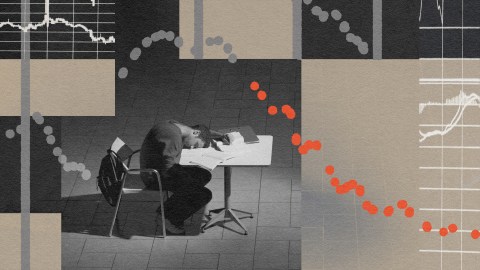Undergraduates’ average IQ has fallen 17 points since 1939. Here’s why.

- A recent meta-analysis found that undergraduates' IQs have steadily fallen from roughly 119 in 1939 to a mean of 102 in 2022, just slightly above the population average of 100.
- "The decline in students' IQ is a necessary consequence of increasing educational attainment over the last 80 years," the researchers commented. "Today, graduating from university is more common than completing high school in the 1940s."
- The decline in undergraduate IQs might just be another indication that the worth of a college degree has been hollowed out over time. Ironically, as it became a baseline for employment, a degree has become increasingly meaningless, as more people have one.
It’s commonly cited that undergraduates are significantly smarter than average, with IQs ranging from 115 to 130. But as a team of Canadian researchers showed in a recently published meta-analysis, that “fact” is woefully out of date.
Conducted by first author Bob Uttl, a psychologist and faculty member at Mount Royal University, and his co-authors Victoria Violo and Lacey Gibson, the meta-analysis aggregated numerous studies measuring college students’ IQs conducted between 1939 and 2022. The results showed that undergraduates’ IQs have steadily fallen from roughly 119 to a mean of 102 today — just slightly above the population average of 100. In short, undergraduates are now no more intelligent on average than members of the general population.
Rising educational attainment
This finding is interesting for a couple of reasons. First, the decrease in undergraduates’ IQs sharply contrasts with the long-observed “Flynn effect,” which describes how IQ scores among the general public have been steadily rising over time. In 1984, James Flynn published a paper showing that Americans’ IQs had risen by about three points per decade over the prior 46 years — an increase that Flynn found was not attributable to recalibrations of IQ tests, which are performed roughly every 15 years. His finding has since been replicated by other researchers, and the climb in IQs appears to have mostly continued (though there are signs it may have reversed in the first two decades of the 21st century).
The recent findings also reflect the notion that being accepted to college today no longer requires the intelligence that it used to — or at least the sort of intelligence measured by an IQ test. While useful, IQ tests are not definitive measures of intelligence. After all, intelligence comes in a variety of forms beyond what questions on a test can reveal.
“The decline in students’ IQ is a necessary consequence of increasing educational attainment over the last 80 years,” the researchers commented. “Today, graduating from university is more common than completing high school in the 1940s.”
As a college degree has been increasingly portrayed as the ticket to a lucrative job and a comfortable middle-class life, a greater proportion of young adults has been attending. Abetting this process are readily attainable government student loans.
But there’s a potential problem with this open door to academia. According to statistics from the National Student Clearinghouse Research Center, only 58% of students manage to attain their degrees within six years. What’s more, the rate of dropping out is negatively linked with IQ — the lower an undergraduate’s IQ, the more likely it is that they will leave college without a degree, potentially saddled with debt. One influential study showed that for white American undergraduates with an IQ only slightly above average, their chance of graduating is essentially 50-50.
Does putting students through such a consequential coin flip benefit them or the academic institutions providing them with a college experience? Over the years, observers have widely opined that colleges have grown more akin to corporations, selling shots at degrees (and a better life) to young, naive consumers. In 1980, the inflation-adjusted price to attend a four-year college full-time was $10,231 annually, according to the National Center for Education Statistics. Thirty years later, the price increased to $28,775. Long gone are the days when universities were vaunted places of learning for inquiring minds. Now, they function more like big business.
It’s a good thing that college is no longer reserved solely for the brilliant and privileged, but swinging the pendulum too far in the other direction also has consequences.
The value of a degree
“Universities and professors need to realize that students are no longer extraordinary but merely average, and have to adjust curricula and academic standards,” the researchers wrote. This means “employers can no longer rely on applicants with university degrees to be more capable or smarter than those without degrees.”
The decline in undergraduate IQs might just be another indication that the worth of a college degree has been hollowed out over time. Ironically, as it became a baseline for employment, a degree has become increasingly meaningless as more people attain it. But rather than aiming for more advanced degrees to set themselves apart, potential students wary of burdensome student debt are increasingly shying away from higher education altogether. Undergraduate enrollment in U.S. colleges has fallen from 16.6 million in 2015 to 14.4 million in 2021.
Last year, for the first time, the Wall Street Journal-NORC poll showed that 56% of Americans think attending college is not worth the cost. Just a decade ago 53% responded that it was worth it. Skepticism is strongest among people ages 18 to 34, meaning that individuals of college age are now the most dubious.





